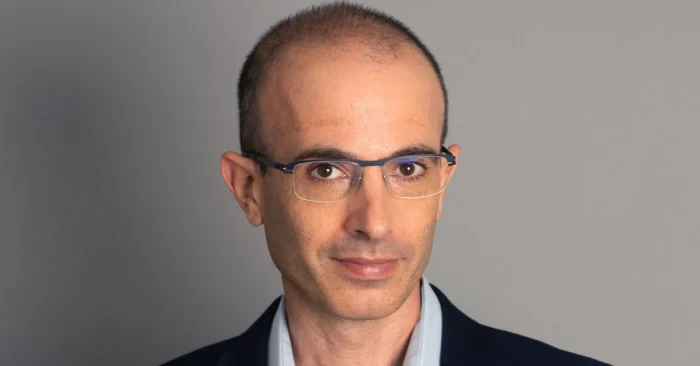Yuval Noah Harari – Biography
Early Life and Education
Yuval Noah Harari was born on February 24, 1976, in Kiryat Ata, Israel. From a young age, he showed a strong interest in history and philosophy, which shaped his academic journey. Harari attended the Hebrew University of Jerusalem, where he completed his undergraduate studies. He later pursued his PhD at the University of Oxford, specializing in medieval history. His doctoral research focused on military history, but his interests gradually expanded to cover broader themes of human evolution and civilization. Harari’s academic foundation combined rigorous historical methodology with interdisciplinary insights from philosophy and anthropology, laying the groundwork for his later work.
Academic Career and Major Works
After completing his doctorate, Harari returned to Israel and became a lecturer at the Hebrew University’s Department of History. He gained recognition for his innovative approach to historical research and his ability to communicate complex ideas in accessible language. His breakthrough came with the publication of “Sapiens: A Brief History of Humankind” in 2011. The book quickly became an international bestseller, exploring the history of Homo sapiens from the emergence of cognitive abilities to the present day. Harari continued this success with “Homo Deus: A Brief History of Tomorrow,” which speculates on the future of humanity, and “21 Lessons for the 21st Century,” addressing contemporary global challenges. These works have been praised for their clarity, depth, and thought-provoking perspectives, making Harari a leading public intellectual.
Philosophy and Themes
Harari’s writings often explore the interplay between science, history, and philosophy. He examines how biological and technological developments shape human societies and individual experiences. A central theme in his work is the impact of cognitive revolution on the human species, enabling cooperation, culture, and complex social structures. Harari also discusses the ethical and existential questions raised by artificial intelligence, biotechnology, and data-driven governance. His philosophical stance encourages readers to critically assess progress and the meaning of human life in an era of rapid change. Harari’s ability to connect historical patterns with future possibilities invites broad reflection on humanity’s trajectory.
Public Influence and Media Presence
Beyond academia, Harari has become a prominent figure in public discourse. He regularly speaks at international forums, including the World Economic Forum, where he addresses policymakers, business leaders, and the general public. His books have been translated into dozens of languages, reaching a global audience. Harari’s approachable style and insightful commentary have made him a sought-after speaker and media contributor. He uses social media to engage with readers and share his thoughts on ongoing developments in science, politics, and culture. Harari’s influence extends beyond scholarship, shaping how many people think about history, technology, and the future.
Personal Life and Interests
Harari lives a relatively private life in Israel. He is openly gay and has spoken about how his personal experiences have shaped his worldview and academic interests. A practicing Buddhist, Harari incorporates mindfulness and meditation into his daily routine, which he credits with helping him maintain focus and clarity. He has expressed that understanding human consciousness is key to understanding history and future challenges. Harari’s blend of intellectual curiosity and spiritual practice distinguishes him among contemporary thinkers. Despite his global prominence, he remains grounded and dedicated to exploring profound questions about humanity.
Criticism and Controversies
While widely praised, Harari’s work has also attracted criticism from some scholars who argue that his broad generalizations sometimes oversimplify complex historical realities. Critics have pointed out that his speculative ideas about the future may be overly optimistic or dystopian, depending on perspective. Some historians caution against interpreting his popular books as comprehensive academic texts. Nonetheless, Harari welcomes debate and sees it as essential to intellectual progress. His ability to provoke discussion on important ethical and societal issues reflects his role as a public intellectual rather than a traditional historian.
Legacy and Future Work
Yuval Noah Harari has redefined how many understand human history and its possible futures. His interdisciplinary approach bridges academic scholarship and popular culture, influencing education, technology debates, and public policy. As the world faces unprecedented technological and environmental challenges, Harari’s insights remain highly relevant. He continues to write and lecture, focusing on the ethical dimensions of emerging technologies and global cooperation. Harari’s legacy lies in his capacity to inspire curiosity, critical thinking, and a broader awareness of humanity’s place in the universe.
Conclusion
Yuval Noah Harari’s journey from a history student in Israel to a globally recognized author and thinker illustrates the power of interdisciplinary scholarship and clear communication. His work challenges readers to reconsider the past, question the present, and imagine the future. Balancing scientific rigor with philosophical inquiry, Harari offers a unique lens through which to view human civilization. His contributions to history, philosophy, and public discourse have made him one of the most influential intellectuals of the 21st century, encouraging ongoing dialogue about what it means to be human.
Frequently Asked Questions (FAQS)
Who is Yuval Noah Harari?
Yuval Noah Harari is an Israeli historian and author known for his bestselling books on human history and future, including “Sapiens,” “Homo Deus,” and “21 Lessons for the 21st Century.”
What are Harari’s main areas of study?
Harari studies history, philosophy, anthropology, and the impact of technology on society, focusing on human evolution and future challenges.
What is “Sapiens” about?
“Sapiens” explores the history of the human species from prehistoric times to the modern era, highlighting key revolutions that shaped humanity.
Is Harari involved in public speaking?
Yes, Harari frequently speaks at international forums and events, sharing his insights on history, technology, and society.
Has Harari faced criticism?
Some scholars criticize Harari for oversimplifying history and making speculative claims, but his work is widely regarded as thought-provoking and influential.






